Ralph Shorrock
Alderman William Snape, J.P., was elected the first Mayor of the newly incorporated Borough of Darwen in July 1878, and was subsequently re-elected to the office in November 1878, 1879 and 1880. He had been a member of the Darwen Local Board since 1859 and after a short break from these duties sought re-election to the Board, following a fever epidemic in 1875, and was then appointed chairman.
At a ratepayers meeting held in the Co-operative Hall on 20th March 1877 he presided over the meeting which adopted a resolution in favour of applying for a Charter of Incorporation for the town. Over the course of ten days a petition to the Queen was signed by 670 ratepayers, and as a result of this, one of the inspectors of the Local Government Board held a public enquiry on the proposed incorporation. On 10th November 1877 a letter was received by the clerk to the local board stating that a charter would be granted.
The receipt of the Charter of Incorporation on 25th March 1878 prompted celebrations in the town. It was announced that Mr Snape would arrive on the train from Manchester, bringing the important document with him. The platform was crowded and outside the station a procession soon formed to escort Mr Snape to the Free Library, which was filled to overflowing. Mr Snape expressed his pleasure at having the privilege of bringing the charter to Darwen and the Town Clerk, Mr Costeker unfolded and read the charter to the assembly.
The first meeting of the Town Council was held in the library on 9th July 1878.
Councillor William Snape was elected Mayor; councillors William Snape, William Pickup, Henry Green, William Entwistle, John Walmsley and Ralph Pearson were elected Aldermen.
Although Mr Snape spent much of his adult life working towards the improvement of Darwen and its residents, he was not a native of the town. He was born on 1st April 1819 in Walton-le-Dale, and was the youngest of a family of eight children. His father, Henry worked as a builder and carpenter there. William received his elementary education in the national school, and afterwards spent a few years in a Moravian school in the county of Chester. Upon leaving school he took up an apprenticeship in the design department of a calico printing works, working there for several years.
On 1st Jul 1840 he married Ann Eccles in Manchester, and their first child Samuel Henry was born in 1841, followed by Emma in 1846, and Gerald in 1851. The family moved to Darwen in 1846 and William took up the position of chief designer in the wallpaper business of C. E. and J. G. Potter. Nine years later he set up business on his own account at Livesey Fold, developing a paper staining business which flourished for several years until it was taken over by the Potters, when William became a partner in that firm.
Sadly his wife, Ann died in 1857 at the young age of 37 years. Later that same year William married Lydia Southam at the Weighhouse Congregational Chapel in the City of London, and their daughter, Elizabeth was born two years later. The family continued to live in Darwen and by 1871 had moved into Lynwood House, where the census entry shows William as a paper manufacturer employing 350 men.
After leaving the firm of Potters he engaged in several other business enterprises, setting up as a cotton manufacturer at Dove Mill, entering into partnership with his son Gerald B. Snape at Woodford Mill, and holding a large interest in a chemical works at Widnes. He was one of the promoters of the India Mill Company, becoming a large shareholder and later chairman of the company.
He retired from business in 1875, having made a substantial fortune, and sought re-election to the Local Board, soon becoming its chairman. During his tenure he devoted his attentions to improvements to the sanitation in the town, extensions to the gas and waterworks, improvements to the river, highways and streets, and encouraged the idea of the building of a new market hall. He continued to serve Darwen in many areas, culminating in his election as the first Mayor of the Borough of Darwen.
At around this time a number of business ventures proved unsuccessful and he put his house, Lynwood, up for sale and moved into the smaller adjacent cottage.
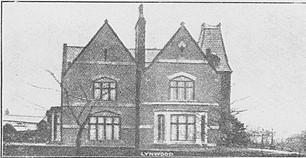
The advertised sale in 1889 describes the house as:
“ An eligible Mansion House, Land, Stables, Greenhouses and Offices, lately the residence of Alderman William Snape J. P. The land contains more than four acres, and is laid out in ornamental grounds, well planted with forest trees, shrubs, flower beds, kitchen garden, lawn tennis grounds , lawn and meadow land. The mansion is gothic, brick built with stone carvings, contains four receptions and seven bedrooms, two nurseries, bathroom and lavatories. Most of the interior woodwork is of polished oak with handsome tiled vestibule and corridors. Hot and cold water is laid on throughout the premises. Within easy distance of a railway station, from which Manchester is reached within forty minutes.”
Throughout his time a public servant he was a strong advocate for raising the educational status of the local people. He took a very great interest in the Darwen Mechanics' Institution, of which he was first secretary and then president, and he assisted in promoting the adoption of the Free Libraries Act by the ratepayers. When the Act was adopted he became its chairman, and one of their earliest transactions was to take over the library of the Mechanics' Institute, which consisted of about 4000 volumes. He continued to take an active part in the purchase of new books, and in the management of the Free Library.
In politics Mr Snape was a Liberal, gaining the highest reputation not only in Darwen but in the county generally. He was one of the founders of the William Street Reform Club, of the Market Street Liberal Club, and of the Hollins Grove Liberal Club.
In order to further the interests of the Liberal party he purchased the “Darwen News” in March 1876. In the first editorial of the newly acquired newspaper Mr Snape stated his intentions to provide a more readable and useful publication, to increase its circulation thereby encouraging more advertising, and thus making it overall a family newspaper. He promised to collect every item of worthy local news and report it in the best manner - the political principles adopted in commenting upon public affairs would be those lying at the basis of true Liberalism, whilst endeavouring to express broad, charitable and generous sentiments in the editorials. He only owned the newspaper until March 1881 when it was bought by Mr John Joseph Riley, a publisher and printer in the town.
In religious matters William Snape was a Baptist, but when he first came to Darwen there was no Baptist church in the town. He therefore attended the services of the Rev. S. T. Porter in the old Ebenezer Chapel, which in 1849 was superseded by the Belgrave Meeting House. There then came a request from members of the Lancashire and Cheshire Association of Baptist Churches to invite a number of gentlemen to a meeting to discuss the possibility of forming a church in Darwen. After several further meetings a small band of them determined to carry the idea forward, and they firstly formed a Sunday School.
The school in William Street was vacant at the time, so it was immediately taken and on the first Sunday of April 1858 the first Baptist Sunday School commenced with just 20 scholars, although that number rapidly increased. Preaching services were also conducted morning and evening, and in the following December a church was formed. Mr Snape was elected one of the first deacons of the church, a position which he continued to hold for many years.
The congregation continued to worship in William Street school and to increase so rapidly that the accommodation became too limited, and they therefore decided to have a chapel of their own. A building committee was formed, with Mr Snape acting as secretary and the new building was erected on Bolton Road at an initial cost of £3,300.
Mr Snape's services to the church continued, and at various times he acted as superintendent, secretary and treasurer to both the church and the Sunday school. He represented the church at the annual meetings of the Lancashire and Cheshire Association of Baptist churches, and at the twice-yearly meetings of the Baptist Union of England and Wales. He was regularly invited to lay corner-stones of new schools and chapels, to open bazaars, to preside at tea meetings and missionary meetings, all of which duties he performed in a pleasant and cheerful manner.
After he retired he and his family spent much of their time at Grange-over-Sands, a place for which he held a great fondness. However his health began to deteriorate and he became almost blind during his final years. He passed away on 31st March 1888, and his body was brought by rail from Grange to Darwen and taken to the Baptist Chapel. Flags on all the prominent buildings in the town were flown at half-mast, and on the day of the funeral a procession was formed in front of the new market buildings, with members of the Lancashire Constabulary, Fire Brigade, gentlemen representing the various Liberal clubs and other religious denominations of the area attending in large numbers, all watched by a crowd of the local townspeople.
A service was conducted at the chapel and his coffin was carried from there by the borough surveyor, the borough treasurer, gas manager and sanitary inspector. Afterwards the procession, which included some 200 members of the church and school, proceeded to the cemetery where his remains were interred in the family vault.
His will was proved at Lancaster later in 1888 and probate granted to his executors :- his
son, Gerald Birch Snape, of Dalston Middlesex, a factory inspector, his nephew Thomas Snape of Liverpool, a chemical manufacturer and Timothy Lightbown of Darwen, a linen and cotton manufacturer. His effects totalled £5,364.
Compiled by Joyce Calder, Janaury 2024
Online resources:
findmypast.co.uk
ancestry.co.uk
Index to Wills and Administrations-gov.uk
Newspapers:
The Darwen Times
Blackburn Standard
back to top
Henry Green
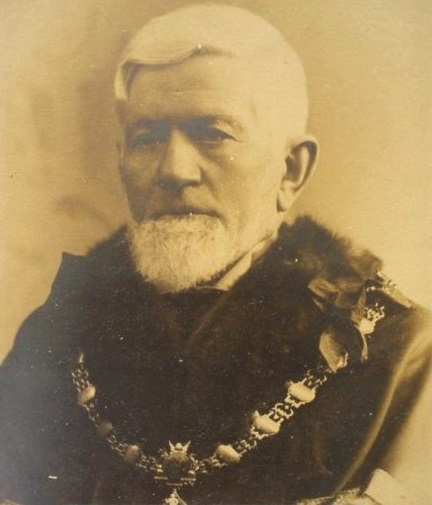
Mayor of Darwen 1881- 1882
Henry was the son of Thomas Green a weaver from Darwen, and his wife, Mary. He was baptised at Darwen St James's Church on 2nd September 1813, as was his older sister, Betty in 1810. Unfortunately, his father, Thomas, died soon afterwards, and was buried at St Mary the Virgin Church in Blackburn, aged only 30 years on 21st December 1815.
The Darwen News notes that Henry was sent to the mill to earn his own living at the age of only six years, which was a common occurrence in those days. The Short Time Act had not yet been passed, so that there were no half-timers, nor was there any legislation in force regulating the hours in factories. Under these circumstances Henry cannot have had any great educational advantages, and it is believed that the only formal education he received was through his attendance at Sunday School.
In 1833 Henry married Ellen Entwistle at St Mary the Virgin, Blackburn, and, by 1841, they were living on Duckworth Street in Darwen with their four young children. The 1851 census shows the family still on Duckworth Street, and Henry gives his occupation as Power Loom Manager.
However by 1861 they had moved to Wood Street, Darwen, now with two more young daughters and 1 servant, and Henry is a Cotton Manufacturer employing 300 people.
He had formed a partnership with Mr Doctor Graham, Mr Thomas Fish, and Mr John Kay, working at Woodside Mills for many years.
In 1886, this partnership was dissolved and a new partnership formed by Mr Green and Mr Graham at Culvert Mill, Watery Lane, Darwen. He later went into partnership with his two sons, Thomas and James, owning a couple of mills in Blackburn.
Mr Green was for many years the chairman of Cotton Hall Spinning and Manufacturing Company, and also of Darwen Manufacturing Company at Carr's Mill.
Henry Green was a member of the Darwen Local Board for many years, and when the town was incorporated as a municipal borough in 1878, he was returned as a member of the Town Council and at the first meeting of that body he was elected an alderman.
During the early part of his career he took an active part in educational matters and was a prominent member of the Mechanic's Institute, which in those days was the principal educational institution in the town. He was a firm believer in compulsory education and was heard to state “ The forced attendance of children at school would be of great value to the rising generation, and would place within the reach of everyone facilities whereby they may, if they think proper, prepare themselves for the better fulfilling of their duties as citizens.”
He was an ardent Non-Conformist and strenuous advocate of civil and religious liberty,
being a member, and for many years a deacon of Belgrave Congregational Church, where his interest in popular education lead him to act as School Manager. When later the new schools were erected he was a liberal subscriber to the building fund, and along with others, exercised a general supervision of the works.
But it was as a temperance reformer that he was most widely known. He was one of the earliest members of the Darwen Temperance Society, which was formed in the summer of 1834, and he was one of a number of local veterans to address a public meeting held on the celebration of the Society's jubilee.
In politics he was a Liberal, and a frequent attender at Market Street Liberal Club in the town, where he also liked to indulge his favourite pastime of chess.
On 9th November 1881 he was unanimously elected Mayor of the Borough. Following his election he drew a picture of what Darwen was like when he was younger, saying “I can remember the time when there were no flagged parapets, no water for domestic use but what had to be carried for long distances, no lamps to light the streets, no gas for household consumption, no removal of night-soil, no sweeping or watering of streets, no collection of refuse, and no control over new buildings or the laying out of streets.”
He was a diligent reader and had considerable literary taste and judgement so that when the Literary Society was started during his mayoralty, its earliest meetings were held in the mayor's parlour. He was rarely absent from its monthly meetings and regularly took part in the debates.
During his mayoralty the new Market Hall was opened on 21st June 1882. Local mills and businesses had been encouraged to allow their workers time off for the afternoon, so the streets were filled with onlookers when the M. P. Mr Frederick Grafton arrived at noon. He was welcomed by the Mayor, members of the Town Council and borough officials, after which there a public procession through the town. On returning to the Market Hall, Mr Grafton was presented with a golden key by Alderman Green, and asked to perform the opening ceremony. Later in the day there was a banquet at the Co-operative Hall and a ball at the Market Hall, the latter being attended by about 1200 people.
For more than twenty years Henry and his family lived at Woodbine House at the junction of Tockholes Road and Vale Street, and it was there that he passed away after a short illness on 8th March 1897 aged 83. His wife, Ellen had died before him in 1890, and they were buried together in Darwen Cemetery.
Probate was granted to his two surviving sons, Thomas and James, both Cotton Manufacturers, and, to his son-in-law Joshua Williamson, a retired Grocer (the husband of his daughter, Ann Jane). His effects totalled £1448 1s.
The funeral service was held at Belgrave Congregational Chapel, attended by the Town Clerk on behalf of the Mayor, and invited council members.
Compiled by Joyce Calder, December 2022
Sources:
The Darwen News
lan-opc.org.uk
ancestry.co.uk
Index to Wills and Administrations-gov.uk
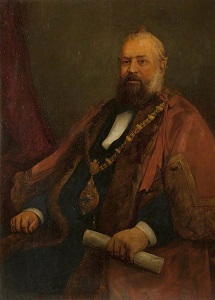
Mayor Of Darwen 1882-1884
© Blackburn Museum and Art Gallery
William Entwistle was the grandson of Ralph Entwistle of Sough, who was one of the principal founders of Wesleyan Methodism in Darwen. When John Wesley visited Darwen in 1785 to found a mission, Ralph Entwistle had the honour of welcoming him to stay at his home. Ralph's son William, a yeoman and colliery proprietor married Betty Smalley, who was the daughter of Robert Smalley of Heyfold and the granddaughter of Reverend Robert Smalley, the pastor at Lower Chapel Congregational Church for 40 years.
William Jr. was born on 7th October 1827 in a house overlooking Belgrave Square in the centre of Darwen, one of seven children of William and Betty, and he was baptised at Darwen Methodist Chapel the following year. He received his early education at the school conducted by Mr Joseph Kershaw in a small room in Bank Lane and he then attended Blackburn Grammar School for several years.
The 1841 census shows William living with his mother, who gave her occupation as farmer, and three of his sisters at Brick House, Sough Road, Darwen, his father having died the previous year. In 1851 he was living nearby at Rosehill House with three siblings and described himself as a farmer's son, but by 1861 he was again living with his mother in Rosehill Cottage. At about this time he went into business with his oldest brother, Robert Smalley Entwistle trading as stone and flag merchants from Rosehill Quarry. Darwen had become famous for the production of stone flags, which were considered superior to others due to their being able to withstand any climate. Messrs. Entwistle continued to grow their business, gaining a reputation as good businessmen who were courteous and obliging to their customers.
On 28th September 1876 William married Sarah Heyworth, daughter of John Heyworth of Strawberry Bank at St. Paul's Church Blackburn and they continued to live at Rosehill Cottage.
William had, by this time, been elected a member of the Local Board in Darwen, and was soon appointed Chairman of the Highways Committee, a position which he held for 18 years. Upon the incorporation of the Borough in 1878 he was elected Councillor for Darwen South East Ward, and at the first meeting of the Town Council he was made an Alderman, a position to which he was re-elected twice more in 1883 and 1889.
On 9th October 1882 William was elected Mayor by a unanimous vote, and at the end of his year of office was invited to accept the position for a further year. In 1885 he was appointed Chief Magistrate for the area, a position in which he gained respect and admiration for the way in which he conducted his duties.
During his time as mayor the Mayoral Sunday processions accompanying him to the service at Railway Road Wesleyan Chapel were impressive. He was also a hospitable host at the banquets which he held for county and borough magistrates, corporation and borough officials, and to which he also invited many of his friends.
On a personal level his interests centred on assisting religious, educational and philanthropic movements, irrespective of any denominational prejudice. He was a member of the Harmony and Industry Lodge of Freemasons, and at the time of his death was the oldest member of the lodges within the Darwen area. He also took a keen interest in Oddfellowship and was a member of the Newtonian Lodge, Manchester Unity. The volunteer movement appealed strongly to his patriotic instincts and he was a generous subscriber to the funds of the local corps.
The Blackburn Standard Newspaper of 29th May 1886 reported:
“Alderman William Entwistle J P, Councillor Robert Arkwright and Mr William Henry Marsden journeyed to Belfast last Monday evening to purchase some additional horses for the new steam fire engine. They arrived back safely in Darwen on Thursday morning with five handsome horses which they have purchased for the town”.
After his period as mayor ended he continued to serve as Alderman until 1891 when he retired from the council. In his resignation letter he explained the reason for his retirement. This was that having by a family arrangement become interested in the flag pits of his nephew, Mr. James Pickup Entwistle in addition to his interests in the firm of Messrs. R.S. & W. Entwistle, and especially because the former firm had business relations with the Town Council, he felt that it would not be in the best interests of the ratepayers to continue his membership of the council.
William died on 23rd February 1898 and probate was granted to his widow, Sarah and to Joseph Greenwood Thomas, bookkeeper, and cashier. His effects totalled £14,772.
Compiled by Joyce Calder March 2024
Sources:
ancestry.co.uk
findmypast.co.uk
Index to Wills and Administrations – gov.uk
Newspapers:
Darwen News
Blackburn Standard
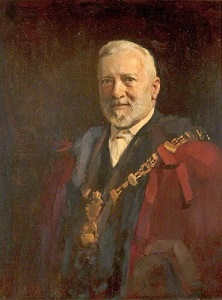 Mayor of Darwen 1884 to 1886
Mayor of Darwen 1884 to 1886Portrait by unamed artist in Blackburn Museum & Art Gallery, Art UK
Timothy was born in Darwen in 1838 to John and Phoebe Lightbown (nee Holden). By 1841 he had emigrated to America with his parents and older sister, Mary Alice; the 1850, 1855, and 1860 censuses show the family living in Paris, Oneida, New York State. In 1861, Timothy married Mary Elizabeth Pritchard, a Canadian by birth, and they returned to England before 1871. The 1871 Census shows Timothy and Mary living at 39 Hindle Street, Over Darwen with their son, William Ellis (born 1862 in Pennsylvania), and sister-in-law, Agnes Pritchard. Mary Elizabeth died in 1871, aged 34 years, and, in the following year, Timothy remarried, as detailed in the Blackburn Standard Newspaper:
“9 October 1872 at United Methodist Free Church, Darwen, by Reverend R. Lyon,
Timothy Lightbown Esq., Manufacturer, of Over Darwen to Miss Alice Kay, Falcon House, Hollin Grove, Lower Darwen”.
Timothy and Alice then continued to live at Falcon House for the rest of their lives. In 1862, Dove Cottage Mill was leased to Timothy and his half-brothers, Henry & Roger, and, in 1882, Brookside Mill was sold to Timothy & Roger who formed the Brookside Weaving Co. Ltd.
Timothy was elected Mayor of Darwen in 1884 and served for two years.
On 14th February 1885, Timothy Lightbown of Falcon House, Darwen became Commissioner of the Peace for the Borough of Darwen.
On 19th March 1892, he and others were elected to serve as Aldermen of the Borough for a period of 6 years.
On 3rd December 1906, Alderman Timothy Lightbown was made Honorary Freeman of Darwen.
A report in the Manchester Evening News notes that on 4th March 1885 the Mayor of Darwen, Mr Timothy Lightbown J. P. gave a donation of £100 to the Darwen Free Library to be spent in books.
Information from Darwen Heritage Centre notes that on October 14th 1886 a much admired fountain was erected at a cost of £200 in Whitehall Park, Darwen, the donor being the then Mayoress (Mrs. Alderman T. Lightbown).
Timothy Lightbown died at Falcon House on 7th September 1910 and probate was granted to his son, William Ellis Lightbown, Salesman, Walmsley Preston Kay, Solicitor, and Moses Ellison, director of a Limited Company. Effects totalled £39,240 15s.
There is an ornate gravestone for him and his wife in Darwen Cemetery with the inscription:
“In Loving Memory Of Alice Lightbown, The Beloved Wife Of Timothy Lightbown Of Falcon House Darwen
Who Died May 30th 1909 Aged 76 Years.
Also of Timothy Lightbown, For 22 Years Alderman of This Borough
Who Died 7th Sept 1910 Aged 72 Years”
After his death, Falcon House (on the corner of Falcon Avenue and Blackburn Road) became Darwen Masonic Lodge, then Darwen Liberal Club, but later fell into disrepair and was demolished c. 2015
Compiled by Joyce Calder February 2022
Sources
Shaw, J.G. 'History and Traditions of Darwen and Its People'
ancestry.co.uk
familysearch.co.uk
findmypast. co.uk
Index to Wills and Administrations – gov.uk
back to top
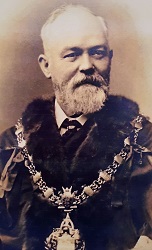
Mayor of Darwen 1886 to 1887
Thomas Grime was born 28th January 1826, the son of John Grime, a weaver of Darwen and his wife Mary (nee Harwood), and was baptised at the Ebenezer Chapel in Darwen on 16th July 1826. He was one of 8 children and the family lived at Green Street Darwen, before moving to Wellington Street, where the 1851 census shows Thomas as a Railway Clerk.
He went to work in the mill at 12 years of age, and eight years later became head cloth-looker at Newfield Mills, Lower Darwen. In 1848 he was appointed station master at Sough, and in 1853 he became cashier at the Hollins paper mill of Messrs. C & J G Potter.
On 14th August 1851 he married Mary Webster (daughter of George Webster of Over Darwen) at Blackburn St. Mary the Virgin church as witnessed by John Carlisle and John Sanderson.
By 1861 Thomas and Mary were living at Top o'th Croft Lower Darwen, and he was clerk to a Paper Manufacturer.
In 1865 he and Doctor Aspinall commenced business as paper manufacturers at Knott Mill Paper Works, which was situated on the land between the present Darwen Library and Darwen Railway Station.
In 1871 he was living at Shorey Bank, Over Darwen.
He and Mary did not have any children, but adopted Albert Carlisle, who was the youngest son of Mary's sister, Jane and her husband, John Carlisle of Clitheroe.
The 1881 and 1891 censuses show Thomas, Mary, Albert and servants living at Heatherby House off Bolton Road in Darwen.
Their adopted son Albert Carlisle Grime married Evelyn Otway Dray in Brixton, London in 1893 but he then died in Darwen on 15th February 1898 aged 34 years, having suffered a fall at his mother's house on Bolton Road.
In January 1867, Thomas was elected to the Local Board of Health with three other local businessmen, and in the following year was appointed chairman of the finance committee, a position he retained until he was appointed Chairman of the Board in 1872.
In February 1869 he was initiated into the Darwen Harmony and Industry Masonic Lodge where he remained a member until his death.
The Preston Herald newspaper reported details of the laying of the Foundation Stone of the Jollie Memorial Church in Barrow on 15th April 1876:-
“The foundation stone of the Jollie Memorial Church, Barrow which is to be erected as a memorial of the Reverend Thomas Jollie, one of the founders of the Lancashire Independency, and first Pastor of the first Congregational Church in North East Lancashire was laid by Mr. Thomas Grime of Darwen.
Mr. H. Harrison, in an appropriate speech, presented a silver trowel, which bore a suitable inscription, and a mallet made of curled oak, to Mr. Grime for the purpose of laying the stone. He then in a workmanlike manner adjusted the stone, and declared it well and truly laid.”
December 1886 saw the opening of a new Temperance Club in Duckworth Street Darwen, as mentioned in the Preston Herald:-
“The new premises of the No.1 Working Men's Temperance Club, the erection of which will involve an outlay of upwards of £1000, were formally opened by Mr. Graham Fish.
Among those who took part in the proceedings were the Mayor (Councillor Grime) and Councillor Timothy Lightbown J. P. (ex Mayor).
After the ceremony a tea meeting took place at which upwards of 400 sat down. The club can now boast of a membership of over 230. A bazaar will be held early next year to clear off the debt.”
The same newspaper had given details of a meeting of shareholders of Knott Mill (Darwen) Paper Company Ltd in November 1877 at which a balance sheet was submitted, showing a considerable loss, which was attributed to the continued depression of trade. It was stated that the market price of paper had declined during the last two years by about 25%, while the price of paper-making materials had very largely increased, so that it was now almost impossible to carry on the trade to a profit. After considerable discussion a resolution was supported by several gentlemen present expressing their entire confidence in the chairman, Mr. Thomas Grime, asking him to accept the position of Managing Director.
However, presumably the paper trade remained difficult and Mr. Grime's bankruptcy hearing took place on 15th May 1889:-
“At the Count Court Blackburn Mr L. Broadbent made application to his Honour Judge Coventry for the discharge in bankruptcy of Mr. Thomas Grime, trading as Thomas Grime & Co. of Knott Mill Paper Works. Mr. T. Edelston, the official receiver, stated that the liabilties were £6,174, whilst the assets had already realised £1,140.”
His death was reported in the Darwen News:-
“We regret to announce the death of Mr Thomas Grime of Bolton Road, which took place between 8 and 9 o'clock in the morning of Wednesday, 22nd May. He had been in a critical condition for a time, and his death was due to congestion of the liver.”
and his funeral in the Preston Herald:-
“The remains of the late Mr. Thomas Grime, an ex-Mayor of the borough were interred at the cemetery. The service was conducted at the residence of the deceased gentleman by Reverend Henry Irving. A large number of prominent gentlemen in the town, principally members of the Harmony & Industry Masonic Lodge formed in procession. The coffin was of polished oak, had brass fittings and was completely covered with a very large number of beautiful wreaths, one of which was formed from forget-me-nots in the shape of a masonic emblem.”
He was buried in Darwen Cemetery, and in 1904 his wife was also interred there.
Compiled by Joyce Calder, September 2022
Sources:
Online Resources:
- ancestry.co.uk
- familysearch.co.uk
- findmypast. co.uk
- lan-opc.org.uk
Newspapers:
- Darwen News
- Preston Herald
Mayor of Darwen 1887 to 1889 and 1908 to 1909
Alexander Thomas Eccles was born in 1851, the son of Joseph and Betty Eccles of Darwen. Joseph was a member of a firm of Cotton Spinners and Manufacturers which ran Ellenshaw and New Bridge Mills, and he later commenced business on his own account, building Bottomcroft Mill on Blackburn Road, before acquiring other mills in Preston.
The 1851 census shows Joseph and Betty living on Union Street, Darwen with their children Joseph (born 1846), and Alexander Thomas. By 1861 they lived at 33 Railway Road, Darwen with their two sons and their daughter, Betsy (born 1855).
Alexander received his preliminary education at a private school in Darwen before attending Blackburn Grammar School. He remained at the Grammar School until he was fifteen years old and then proceeded to Cranfield College at Maidenhead for a further two years. His education completed, he entered his father's mills to gain an insight into the cotton business, but was encouraged by his father to travel and visited many parts of the British Isles, also Canada, the United States of America and several European countries.
The 1871 census shows Alexander living at High Lawn, Blackburn Road, Darwen with his parents and siblings, but by 1881 he and his widowed father were at the same address with two servants.
In 1876 Alexander was the secretary of the newly founded Congregationalist Church
at Hollins Grove, being one of those who established a Sunday School there. For thirty years after the church was established he was the choirmaster.
In 1883 Mr Eccles became a member of the Borough Council, as one of the representatives for North West Ward, succeeding his uncle, Mr Thomas Eccles J. P.,
in that position. His first appointment was as vice-chairman of the Finance Committee and not long afterwards he succeeded Councillor Grime as chairman. In September 1889 he was made a Justice of the Peace for the borough, and in the following year was made an Alderman.
In 1887 Mr Eccles was invited to the position of Mayor. He accepted the offer and served the office for two years. During the first year of his mayoralty his eldest son Joseph was born and he and Mrs Eccles were the recipients of a silver cradle, suscribed for by the members of the council.
In 1895 he was invited by the Liberal group in Chorley to stand as the Liberal candidate in the forthcoming contest to become Member of Parliament for Chorley, but he declined the invitation, leaving the only other candidate, the Conservative member Lord Balcarres to receive the nomination.
In 1905 he was the first Borough Magistrate to be added to the Commission of the Peace for Lancashire, and was later invited to become Mayor again for the 1908 – 1909 period.
He remained a member of the council until 1920, during which time he was associated with every committee, serving as chairman on most of them, and at the time of his retirement was its oldest member.
He had married Helena Mills who was the daughter of Abraham Mills, a cotton manufacturer of Middleton, Lancashire at the West End Church in Southport on 24th November 1886.
Alexander and Helena had 5 children – Joseph Louis (born1888), Muriel (1889),
Ethel Mary (1890), Hubert Ballantyne (1891) and Bessie (1895).
The family regularly visited Grange-over-Sands in Cumbria, and the 1891 census shows the three eldest children and their parents at Oneglia Lodging House, The Esplanade.
By 1901 their two sons Joseph and Hubert were boarders at Bilton Grange, Dunchurch near Rugby, which was a school originally set up by Reverend Walter Earle in 1887. Their three sisters were at that time living in Grange-over-Sands with 2 governesses and other servants, but their parents do not appear in the census.
In 1911 Alexander, Helena and their 4 eldest children were resident at “The Grange” in Hawkshaw Avenue with five servants. Their youngest child Bessie had died in 1904.
Having been one of the founders of Hollins Grove Congregational Church in 1876,
Mr Eccles was closely involved in the planning and fundraising for a new chapel which was to be built nearby, which meant that the original building could be used as a Day and Sunday School providing accommodation for 518 scholars. The estimated cost for the new chapel and organ, plus alterations to the old building was £8,000 to £9,000.
A special subscription tea party was held in February 1905 and promises to the Chapel Building Fund were shown to be already over £1,300. Fundraising continued throughout the following year by way of a Carnival, Garden Party, Sale of Work etc so that the total reached over £3,000. It was noted that Mr Eccles made a contribution of £1,000 and in addition promised to subscribe £2 for every £1 contributed, up to a total of £500.
February 1907 saw the laying of the foundation stone by Mrs Alexander Eccles, and in December of the same year the new Chapel was opened by Miss Eccles, by which time the funds raised had increased to £6,115.
Alexander and his wife spent their summers in Anglesey, and in 1914 The London Gazette reports that “Alexander Thomas Eccles Esq. of Uwchydon, Treaddur Bay, Holyhead and The Grange, Darwen Lancashire is to be nominated for Sheriff of Anglesey for 1915.”
In 1920 he was one of three Aldermen who had the Freedom of the Borough of Darwen conferred upon them in recognition of their services, the others being Alderman Carus of Hoddlesden Hall and Alderman Cocker of Inglewood.
In 1925 he moved to Grange-over-Sands, Cumbria and shortly afterwards the congregation of Hollins Grove Chapel held a large assembly in the school at which a specially commissioned oil portrait of Mr Eccles was presented to him in recognition of his many years' service to the Chapel.
He continued to visit Darwen to meet his friends and acquaintances until his death in Grange in May 1934. His wife Helena had died there only a few months earlier.
Probate was granted on 10 July 1934 to his sons Joseph Louis Eccles, nurseryman, and Hubert Ballantyne Eccles, poultry farmer, and to his son in law Robert Brian Bickerdike, chemical manufacturer. His effects amounted to £86,755 17s.
Compiled by Joyce Calder, November 2022
Sources:
The Darwen News
Hollins Grove Congregational Church, Souvenir of Opening – Darwen Library
ancestry.co.uk
findmypast.co.uk
Index to Wills and Administrations – gov.uk
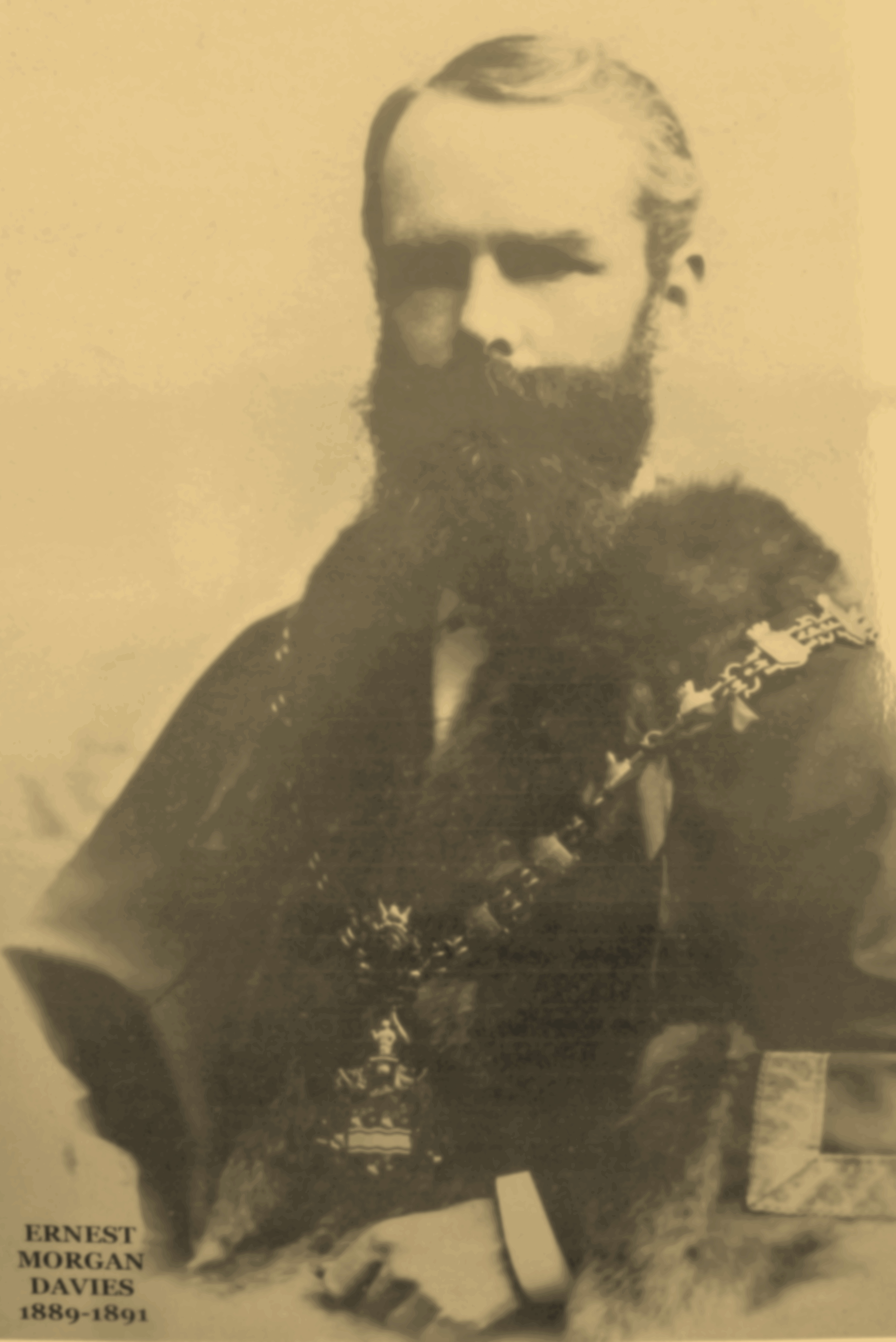
Mayor of Darwen 1889 to 1891
Mr. Ernest Morgan Davies became Mayor of Darwen in 1889 and served two years in the office. Although not a native of Darwen, he had been closely connected with the borough for the greater part of his life, his father Rev. Thomas Davies being the pastor of Duckworth Street Congregational Church for twenty years.
Mr. Ernest Davies was born in Maidenhead Berkshire in 1848 where he attended a boarding school, distinguishing himself in his studies. He then came to Darwen when he was 13 years old with his parents and six younger siblings. He spent two years at the Blackburn Grammar School, followed by one year at Preston Grammar School after which time he attended his uncle's school, Cranford College in Maidenhead for a further three years.
Whilst a pupil at Blackburn Grammar School he and three of his classmates were put forward for the Oxford University Local Examinations held throughout England. All candidates were required to satisfy the examiners in arithmetic, spelling, composition, good handwriting, the analysis and parsing of Paradise Lost (book 1), geography, english and history. In addition to this preliminary examination every candidate was required to choose between one and four further papers, of which Davies chose Latin, Greek and Mathematics. All three boys passed the examinations, and they and all the other pupils at the school were given one day's holiday to celebrate their success
Ernest Davies' father wished him to pursue a business career and so sent him, upon finishing school, to learn the business of cotton manufacturing with Mr. John Goodier at Peel Mills in Preston.
In May 1869 Mr. Davies set up business as a cotton manufacturer in Darwen, his father having purchased and completed the unfinished mill at Greenfield, running 246 looms there. His younger brother Mr. Thomas Pearce Davies later joined him in the concern and the business greatly expanded, eventually running 1100 looms and associated preparatory machinery, providing employment for 450 men, women and children. This partnership continued until 1908 when it was dissolved by mutual consent, and the business was continued by Mr. Thomas Davies' two sons.
Although Mr. Ernest Davies was a member of the Town Council for a number of years, it had been largely in religious circles that he was best known in the town and district. He had been prominently associated with Congregationalism from the time he came to Darwen, and became a teacher at Duckworth Street Sunday School. When a branch Sunday School was established at Hollins Grove some years later he became superintendent there until the new chapel was erected in 1882, at which time he returned to the parent church at Duckworth Street. There he became superintendent, manager of the day school and member of the Chapel Committee.
Duckworth Street Chapel had been opened in 1853 and in 1906 a new larger organ was installed, necessitating structural changes to the building. At the same time a new oak pulpit was added to match the existing organ case, both of which had been paid for by Mr. Davies as a memorial to his father, the late Rev. Thomas Davies at a cost of about £1,500.
He also won a place in the Councils of the Congregational Union of England and Wales
and in 1910 was elected chairman of the Lancashire Congregational Union. He was a director of the London Missionary Society and in his later years devoted a great deal of time to the welfare of the blind, becoming honorary secretary of the Darwen Blind Society.
In August 1872 Ernest Davies married Mary Ann Tweedie, daughter of John Tweedie of Rerrick, Kirkudbrightshire and they set up home at Cranberry Cottages, Over Darwen, close to Greenfield Mill. They went on to have two children, Constance born in 1873 and Charles Ernest two years later.
It was in 1884 that Mr. Davies was elected to the Town Council as the Liberal member for South East Ward, a position to which he was re-elected unopposed in 1887. This latter year also saw him appointed Justice of the Peace, and he became an Alderman in 1895.
During his long service to the council he was chairman of many of the important committees, including gas and water, the health, highways and finance departments.
In 1889 Mr. Davies was chosen to be Mayor of the Borough, an honour which was repeated twelve months later.
The 1911 census shows that Mr. Davies had moved to Moorthorpe, Park Street, Darwen having been recently widowed, and he continued to live there, with two servants, until his death in January 1929. His will showed his estate was worth in excess of £39,000 and probate was granted to his two grandsons, Robert S. Halliwell and Charles D. Halliwell. He bequeathed £300 each to his domestic servants, Sarah Kirkup and Jane Newbigging, and £100 to his gardener, Aaron Cronshaw.
The interment took place on Friday, 11th January at Darwen Cemetery preceded by a service at Duckworth Street Congregational Church.
Compiled by Joyce Calder, March 2023
Sources:
ancestry.co.uk
findmypast.co.uk
Index to Wills and Administrations – gov.uk
Newspapers:
Blackburn Times
Blackburn Standard
back to top
Mayor of Darwen 1891 to 1892
Moses Duxbury was born December 10th 1835 at Bury's Yard, Bolton Road, Darwen, one of thirteen children of Mr. Andrew Duxbury, who sadly died when Moses was only four years of age. He was first schooled by Mr. Thos. Kershaw in Bridge Street, and subsequently went to Belgrave Schools until the age of sixteen.
On leaving school he went to learn paper making, being apprenticed with Messrs James Wrigley and Son, Bridge Street Mill, Bury. On the completion of his apprenticeship, he went to Messrs Chadwick and Taylor's Broughton Grove Mill, Manchester, as machineman. There he was promoted to manager, and after holding the position for a few years, he went to South Wales as manager of the Ely Paper Mills near Cardiff.
In 1867 at the Gravel Lane Wesleyan Chapel, Salford he married Mary Ellen Rogers, daughter of Mr James Rogers of Higher Broughton, and the 1871 census shows Moses, Mary Ellen and their first child Joseph Andrew living at Paperwork House, Llandaff, Cardiff. After a stay of five years in Wales the family moved to Bury where Moses took up the position of manager at Messrs Newbold Bros' mill.
He remained there for four years before returning to Darwen as manager of Spring Vale Mills for the Darwen Paper Mill Co. Ltd., which had been formed in 1871 by a co-operative of working men. The Company originally worked the Lower Darwen Mill and having gained considerable success there they were able to purchase the Spring Vale estate and commenced the manufacture of newspaper. Prior to Mr Duxbury taking the management of the news mill, Spring Vale Mill had never paid a dividend, but after two year's service from him the company was able to show a profit – a success which continued for many years.
By 1881 Moses and Mary Ellen were living at Valemont House, Causeway Street, Darwen with their children Joseph Andrew (born 1870), Frederick William (1872), Lydia (1874) and Harry (1878). Their youngest daughter, Beatrice was born in 1872.
Mr Duxbury was evidently held in high regard for the way in which he continued to manage the Darwen Paper Mill Company, and when he was approached to accept the Mayoralty of the Borough in 1891 he placed the invitation of the Town Council before his board of management for their consideration, pointing out that whatever they decided upon he would willingly carry out. Without hesitation, however, a full meeting of the board unanimously decided that their manager should accept the honour conferred upon him.
In the following year he was created a Justice of the Peace for Darwen. Perhaps his chief public duties were those associated with Darwen Town Council. He was elected unopposed as a representative of the South West Ward in the year 1881, and up to the time of his retirement in August 1903 he had never had his seat contested.
In 1891 Mr Duxbury was created an Alderman and was also made chairman of the Cemetery Committee and the Waterworks Committee, the latter post being retained by him until his retirement in 1903.
He was a Liberal in politics, and although at one period he was president of the Bolton Road Reform Club, he was not regarded as a very active politician. He was also a member of the Harmony and Industry Lodge of Freemasons.
In later life he regularly spent weekends at his second home in Station Road, Blackpool, very close to Victoria Pier (now South Pier), and was Chairman of the Pier Company for many years. It was here that he suddenly became ill with Brights disease, and he passed away a few days later on 5th April 1906, surrounded by the members of his family. His body was returned to his Darwen residence to await burial in Darwen Cemetery, after a private service conducted by Reverend Bramwell Brown, Wesleyan minister.
Probate was granted to his widow, Mary Ellen and his son Harry, paper mill manager.
His effects totalled £15,200 12s 10d. Mrs Duxbury continued to live in Blackpool until her death there in 1926 at the age of 81.
Compiled by Joyce Calder, August 2023
Sources:
Image courtesy of Darwen Heritage Centre
The Darwen News
findmypast .co.uk
Index to Wills and Administrations-gov.uk
Published September 2023.
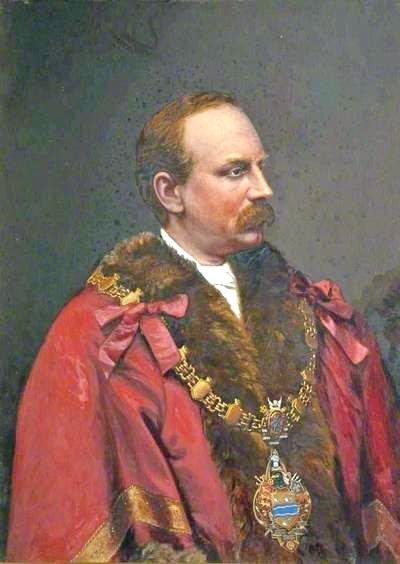
Mayor of Darwen 1892 – 1894,
1913 – 1915,
1927 – 1928
James Cocker was a member of the Cocker family from Tockholes, several of whom were active in the government of Darwen for many years. Mr Cocker's grandfather, James Cocker, came originally from Tockholes and settled in Sough. Amongst his other occupations he was the road surveyor for Over Darwen, appointed by the Manorial Court, with powers to levy a cess on the tenants of the manor for the repair and maintainance of the roads. This James Cocker married a Miss Entwistle and had four sons and three daughters.
One of the sons was named Samuel and he became a grocer and musician. He was also a member of the town council for three years. James Cocker the elder was associated with the Wesleyan Methodists in the town, working in the Sunday school, however Samuel connected himself with the Primitive Methodists when they came to Darwen in 1819.
He was an accomplished musician, playing bass viol in the band which accompanied the singing at the services in the Primitive Methodist Chapel in Redearth Road. This chapel was demolished in 1972 and Darwen Aldridge Community Academy was built on the site, but not until all of the bodies from the graveyard were re-interred at the local cemetery with an appropriate memorial. The council also commissioned an archaeological survey at the site, during which the remains of 131 individuals were recovered. The burial ground appeared to have been well organised, with well-ordered grave plots, many of which had been used for multiple, presumably family, interments. Surviving fittings suggested that the coffins had been modest, although a number of people had been buried with strings of beads, as well as finger rings and other vestiges of clothing and personal adornment.
Samuel Cocker married Alice Eccles, daughter of Richard Eccles, a grocer and coal dealer in Bolton Road. When Richard Eccles died his son-in-law, Samuel, succeeded to the business and carried it on for the rest of his working life.
James Cocker was the eldest of Samuel and Alice's seven children, and was born on 8th July 1850 at Bolton Road. He was sent to Astley Street school, which had been been built as a factory school by Eccles Shorrock. There he received the rudiments of his education, his schoolmaster being Squire Seddon. He afterwards went to Belgrave School and later to the night school run by Abraham Pinder, who was a noted mathematician.
He then had two quarters at the Mechanics' Institute to complete his formal education.
For a time James assisted his father in the shop and collected accounts, but in 1872 he went to work as a miner at one of the local coal mines. Two years later he began work at John Knowles' building contractors, firstly as bookkeeper and cashier and then as manager of the Thorney Heights and Radford Quarries.
In 1878 he married Ann, the daughter of John Knowles, and later became manager of the whole of the building firm, which at that time was one of the largest in East Lancashire. Contracts were secured and completed for mills and factories, reservoirs and public works, banks and places of worship, (including the Primitive Methodist Chapel in Redearth Road), as well as many houses in the town.
James and Ann had two children, Alice born in 1878 and John Stanley, born in 1893 during the first of his father's mayoralties, and the council presented him with a silver cradle to celebrate the event. Unfortunately John Stanley died when he was only 2 years old.
The family lived at various addresses in Darwen, and by the 1901 census they had moved into “Inglewood” on Whitehall Road, the property remaining in the family until at least 1946 when Alice Cocker died.
James Cocker served five terms as Mayor, the first time in 1892 – 1894 (two years), the second time in 1913 – 1915 (two years), and again in 1927 – 1928 when the town celebrated the golden jubilee of its incorporation, and when he presented a chain to the town to be worn by future mayoresses.
Mr Cocker was also senior Borough Magistrate and senior County Magistrate, having been appointed to the borough bench in 1894, and to the county bench in 1917. He had had the Honorary Freedom of the Borough conferred upon him in 1920 at a presentation evening at the Library Lecture Room, along with fellow Aldermen Alex. T. Eccles and Alexander Carus.
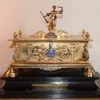
Silver Casket conferring Honorary Freedom of the Borough to Mr James Cocker
James Cocker was a Primitive Methodist all of his life, and when in 1870 Sandhills Chapel was built in Lark Street Darwen, it was at his suggestion that the building also became a day school. He devoted a lot of interest to the school, becoming a teacher, the secretary and then superintendent using his influence to ensure things were done in a well organised manner. In 1876 he was appointed day school manager and treasurer – a position which he held for more than 25 years.
When in 1895 it was decided to build a new chapel at the end of Park Road, he gave the site, valued at £500, suscribed further to the building fund and supervised its erection. He and Mrs Cocker also presented a magnificent five-pipe organ which was installed as a memorial to their young son who had recently died. For more than thirty years he was a teacher of the young womens' class at the school, at which there were regularly 70 attendees. For 36 years he was circuit steward of the Primitive Methodists (Darwen Circuit) having been re-elected at 146 quarterly meetings.
James Cocker held many positions in the borough of Darwen. He became a Town Councillor in 1886 as one of the members for the South West Ward, and he continued to represent that ward without ever having a candidate nominated against him. In 1896 upon the death of Alderman Pickup he was made Alderman of the borough, a position he resigned in 1932 after he had completed 46 years of service as a public representative. At various times he served many years as chairman of the Highways, Education and Old Age Pensions Committees.
He was a past Master of the Harmony and Industry Masonic Lodge (381) and member of the Hutchinson's Chapter of the Royal Arch Masons there. He was founder and treasurer of the Peaceful Valley Lodge (4111), both of which lodges held their meetings at the Masonic Hall, Hawkshaw Avenue.
Mr & Mrs Cocker had been married more than 50 years when she died in 1928. In her later years when poor health meant she was not able to support her husband in the duties of Mayoress, their daughter Alice proved to be a capable replacement for her, especially during his last mayoralty.
James Cocker passed away on 8th February 1935 at his home “Inglewood” in Darwen at the age of 84. The funeral service, which was held at Park Road Methodist Church was well attended by representatives of many groups in the town. The congregation filled the building and in the pulpit there were three former Ministers of the Circuit as well as the then Minister, Rev. H Smith who led the service. A full choir was in attendance accompanied by Mr. John Cocker at the organ.
Probate was granted to his daughter, Alice Cocker, Rev. William Barker and Rev. John Hodges, Methodist Ministers, and to Samuel Cocker, builders' clerk. His estate was valued at £19,233.
Compiled by Joyce Calder September 2023
Sources:
Image courtesy of Darwen Heritage Centre
findmypast.co.uk
ancestry.co.uk.
Darwen News
Primitive Methodist Leader
Index to Wills and Administrations.gov.uk
Published October 2023
William Pickup was born 6th March 1827, the eldest son of the eleven children of George and Jane Pickup of Prince's Farm, Marsh House, Darwen. By 1841 the family had moved a little way to Hatton's Farm, Blacksnape where the family continued to farm for at least another 40 years.
As a child William attended the Lower Chapel School, becoming secretary to the Sunday school, and later treasurer and committee member for the church congregation. When the secession took place at Lower Chapel, which led to the formation of Duckworth Street Church, he associated himself with the new church, taking on similar responsibilities as he had previously. He continued his allegiance to the church throughout his life and was noted for the strict regularity of his attendance there.
In 1861 William married Hannah Thompson, the daughter of Jeremiah and Ellen Thompson of Blacksnape. There were four children born to the couple—George.0 (1862), John (1864), William (1866) and Jane Ellen (1870) but sadly George and William both died in infancy.
In 1857 William entered into partnership with Mr. James Halliwell of the George Street Mills, and afterwards in 1868 entered into partnership with his brother, John Pickup and his brother-in-law, James Holden at Bank Top Mill near the centre of Darwen. The mill had been built in 1859 as a weaving mill with just 124 looms, but was extended to operate with 816 looms. Until 1890 William was still in partnership with his brother-in-law's son, Mr. George Pickup Holden, but shortly after the disastrous fire that occurred at the mill about that time the partnership was dissolved.
After this time he was happy to return to his favourite occupation of farming. He was by then the owner of several farms and could regularly be found hard at work in the fields whatever the weather. His knowledge of livestock was great, and he was a familiar figure at the Blackburn Cattle Market.
Mr. Pickup first served the local authority as member of the Local Board, and then as a member of the Town Council on the incorporation of the borough on 1st July 1878. At the first meeting of this council he had the honour to be elected Alderman of the borough for Central Ward, a position he held unopposed for many years.
An almanac published for 1881 shows Alderman Pickup's many committee interests:
Chairman of the Finance Committee, member of the Gas and Water, Highways, Health and Nuisance, Buildings and General Purposes, and Town Improvements Committees.
He was elected Mayor and Chief Magistrate for the borough on 9th November 1894, and during his Mayoralty he gained a reputation for plain speaking and common sense in all his dealings with the council. He went about his work quietly and steadily, and during his 27 years of service to the council gained the respect of his peers. It is noted that he was seemingly indifferent to personal appearance and fashions, and was never seen wearing an overcoat in even the dreariest weather.
When his year as Mayor ended in 1895 he left £100 to the town council to spend as it thought fit. He was elected to be Deputy Mayor to Mr. Alexander Carus for the following year, but sadly soon after this he was suddenly taken ill and after only a couple of days died from pneumonia.
The funeral was planned for 25th November 1896 and as the cortege left his home in Beatrice Terrace, Redearth Road the street was lined with well-wishers who wanted to pay their respects to a well-regarded citizen of Darwen. The first part of the procession, consisting of the hearse and nine coaches, reached the Circus just before three o'clock, where it was joined by several Corporation officials, members of the Town Council, local gentlemen and workers from Bank Top Mill and a number of other mills and shops in the town which were closed for the day.
As the procession made its way up Bolton Road to the cemetery the many onlookers began to hear of the sad news that his widow Mrs. Hannah Pickup, who had herself been seriously unwell for some time, had passed away shortly before the cortege left their home. The funeral service was held in the cemetery chapel, conducted by Rev. W.C. Russell, Pastor of Duckworth Street Chapel and the interment took place in the Congregational section of the cemetery.
Compiled by Joyce Calder November 2023
Sources:
The Darwen News
ancestry.co.uk
findmypast.co.uk
Published November 2023
back to top
Alexander Carus was born 11th September 1842 in Blackburn to John and Catherine Carus and was baptised at St. Alban's Church one week later. His father was a well-known grocer and provision dealer in the town, trading from premises in Penny Street for many years.
Alexander received a private education and when he left school he went as a clerk in the employ of Messrs. Backhouse, solicitors in Blackburn. He left that position after four years, choosing instead to become involved in the cotton business, and for the next two years he worked at the renowned firm of Messrs. Tootall, Broadhurst and Lee, handloom and fabric manufacturers. He then spent a number of years with Mr. Richard Greenwood at Duke Street Mill, Blackburn.
By the age of 23 his experience was such that he could take over management of one of the mills belonging to Mr. James Astley of Blackburn. He subsequently became associated with Mr. Edward Healey of Preston, maintaining his connection with this gentleman for 10 years – five as manager and five as managing partner.
On 2nd August 1870 he married Agnes Shakeshaft, daughter of Richard, a tallow chandler of Blackburn. Alexander and Agnes set up home in Little Hoole, Preston before moving to Lytham St. Annes for a number of years with their growing family. By 1891 the family were living at 135 Bolton Road, Darwen and Alexander gives his occupation as J.P., Town Councillor and Cotton Manufacturer. He and Agnes went on to have 10 children altogether, five boys and five girls.
It was in 1882 that Alexander was appointed Borough Magistrate and about the same time he purchased St. Paul's Mill, Hoddlesden from Messrs. J. & R. Knowles. In 1890 he leased from Hoddlesden Manufacturing Company the weaving shed which they had rebuilt after a disastrous fire the previous year, and fitted it with new machinery. In the two mills there were more than 1039 looms.
From these mills, assisted by his sons, he ran a large and flourishing business which provided employment for many of the residents of Hoddlesden. The employees were expected to work 55 hours per week – Monday to Friday 6am to 5.30pm with 30 minutes break for breakfast and 1 hour break for lunch, and Saturday mornings 6am to1pm. A whistle was blown each morning at 5.15 am, followed by a 2nd whistle at 5.45 am, and workers were expected to be at their appointed places by 5.55 am. Equally, Mr. Carus would himself be regularly seen at work by 6am.
In 1886 he was honoured by being made a Justice of the Peace for the borough, in which role he gained a reputation for discretion and impartiality. In 1890 he was appointed County Councillor for Darwen and was elected to several committees, including Public Health and Education, becoming Chairman of the Gas Committee. He was the Councillor for North-West Ward having defeated a Socialist candidate by a large majority, but in 1892 he withdrew from that ward and was returned without opposition for the South-West Ward, the ward in which his works were situated. He again had a walkover in the ward in November 1895 and a few days later was elected Mayor of Darwen, becoming the first Roman Catholic Mayor of the town.
His devotion to his church was well known and he had been presented to the Pope on a number of occasions. He was one of the stalwarts of St. Joseph's Catholic church in Darwen and was present when the foundation stone for the new school was laid by Bishop Bilsborough in August 1896. A little over a year later he opened the new school which had been built at a cost of £3,000.
During his mayoralty the diamond jubilee of Queen Victoria occurred and Mr. Carus was presented to the Queen along with other mayors of the county. On 22nd June 1897 he had the honour of cutting the first sod in preparation for the building of Darwen Jubilee Tower.
It was a hot summer's day and in the evening there was a bonfire and fireworks display.
In this same year the opportunity arose for Mr. Carus to take on the lease of Hoddlesden Hall, where he then lived for many years. He was very interested in the social affairs of the village and was one of the gentlemen who did much to acquire the establishment of a branch public library, and also lobbied for a tram service for Hoddlesden which proved a great boon for the residents there.
In 1906 he was invited to open a bazaar at St. Gregory's Church in Farnworth, Bolton and made use of his speech to make reference to the Education Bill, saying that he hoped that the denominational system would still be allowed. He stood for parents having the right of educating their children in the faith of their parents – whatever their religion might be.
At the same occasion, a communication from the Bishop of Salford was made public, announcing that His Holiness the Pope had decided to confer the Order of the Knighthood of St. Gregory upon Alderman Carus, a distinction rarely bestowed by the Church of Rome.
Shortly after the 1914 –1918 war ended it became known that the Rankin Estate, comprising Hoddlesden Hall and 14 nearby farms was up for sale. Alexander took the opportunity to buy the whole estate in October 1920 on behalf of A. Carus and Sons Ltd.,
for the sum of £26,100. This opened prospects for development, giving his company the security of water rights which was essential to meet their plan for the installation of a Bleaching Plant in Hoddlesden. Unfortunately, Mr. Carus died shortly after this acquisition and the business continued with his son Alexander Jr. as chairman, along with his other sons Edmund, Francis and Walter.
In July 1920 Mr. and Mrs. Carus had celebrated their Golden Wedding anniversary and in the following month Alexander was made Freeman of the Borough of Darwen in recognition of his many years of public service in the area.
After his death on 21 December 1920 his remains were conveyed from Hoddlesden Hall to St. Joseph's Church, Darwen and a requiem mass was celebrated the following day. There was a very large congregation for the funeral service, including the chief family mourners, representatives of his mill workers, of Darwen Town Council, Lancashire Town Council and many other local societies. There followed a private interment at Pleasington Priory.
Probate was granted in London to his widow, Agnes his sons Alexander Hubert, Edmund Louis, and Frances Xavier and to his daughter, Ethel Leo Mary Carus. His effects totalled
£89,272. Agnes continued to live at Hoddlesden Hall until her death on 25th September 1929 and she was then buried alongside her husband at Pleasington.

Headstone of Alexander Carus, Pleasington Priory
Compiled by Joyce Calder, June 2024
Sources:
“Cathy Carus Notes” and portrait - Darwen Local History Library
The Darwen News
findmypast. co.uk
ancestry. co. uk
Index to Wills and Administrations.gov.uk
back to top
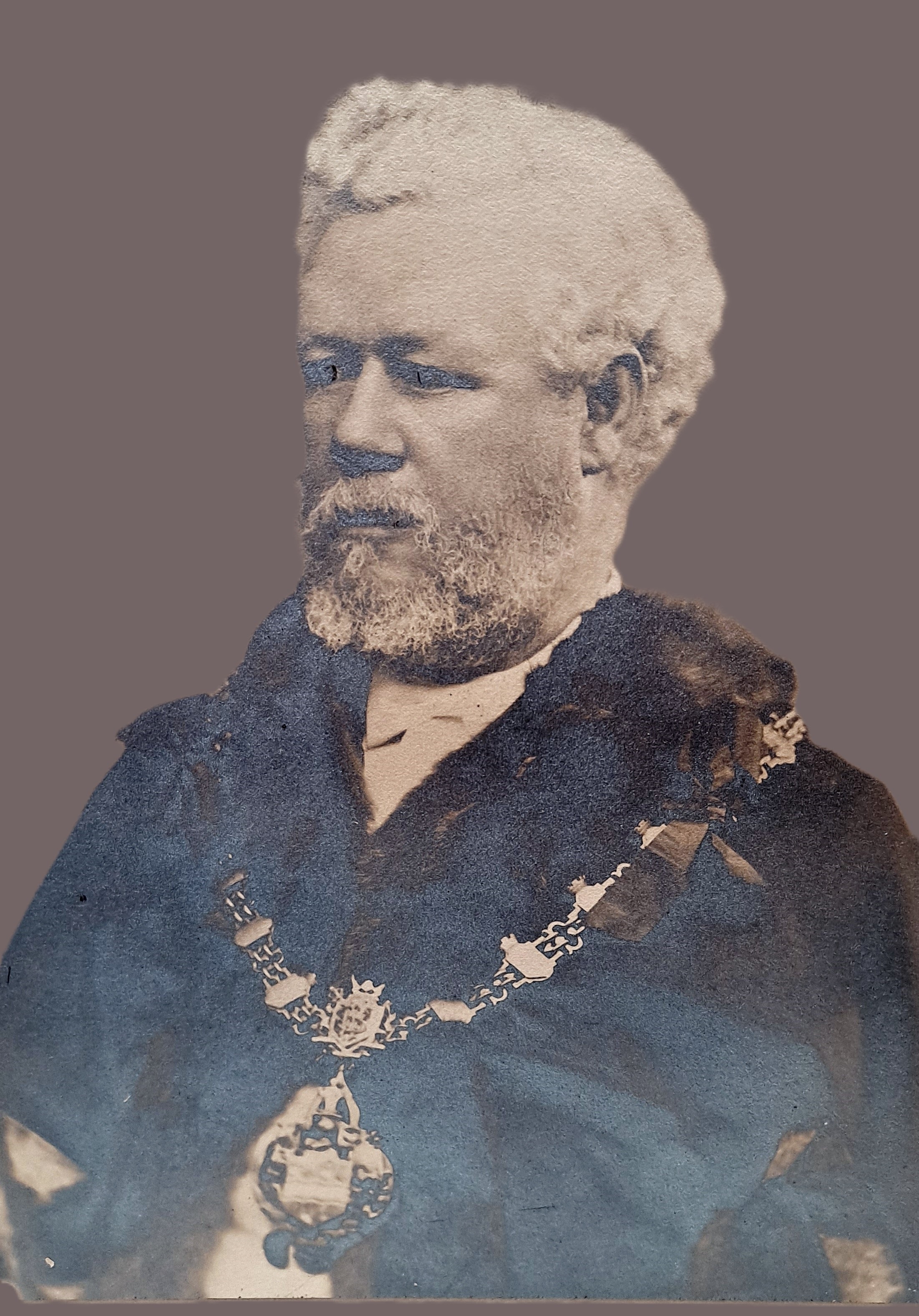
Mayor of Darwen 1897 - 1898Charles Huntington was not a native of Darwen, having been born in 1833 at Mitcham, Surrey, the eldest child of James, an engraver, and his wife Harriet. Upon leaving school he learnt the art of designing at his father’s business in Mitcham, which was at that time the centre of a large calico printing industry. Afterwards he worked with his older brother, James Huntington, who was by then established in London in his design and silk printing business, but who came to Darwen as managing partner in the firm of Messrs. C. and J. G. Potter, wallpaper manufacturers, in 1864.
At the age of 21 Charles went to Paris and gained a high reputation for drawing and as a colourist, and after a few years his studio was one of the largest in the city. He then joined his younger brother, William Balle Huntington (trading as “Huntington Frères”) conducting a continental agency for Potter’s Paperhangings, and by their knowledge of markets and languages they were able to build up a large export trade for the firm.
In the meantime, James Huntington had so developed the wallpaper business of Messrs. Potter in Darwen that he invited his brothers to join him in that business, which they did – Charles to be in charge of the art department, and William as head of the commercial department.
In May 1876 Charles Huntington married Jane Hudson Sparkes at St. John the Evangelist church in Darwen. For a short period after their marriage they resided in a house overlooking Corporation Park in Blackburn, but on the death of Mr James Huntington in 1878 they moved to Astley Bank in Darwen, the house which had been owned and occupied by him.
Charles and Jane had eight children in total, Amy (born 1879), Sylvia (1880), Marguerite (1881), Henry (1885) and Charles (1888), plus three other sons who died in infancy.
They began to improve and expand Astley Bank House, building another storey to accommodate their many visitors, adding a ballroom, and the house was one of the first in the area to have electricity installed.
Politically Charles Huntington was a lifelong Liberal and in 1880 at a large demonstration at Darwen Theatre Royal he lent his support to the two Liberal candidates for North-East Lancashire. At the general election of 1885 he actively supported Mr J. G. Potter as Liberal candidate for Darwen division, but he was unfortunately defeated.
In 1888 Charles himself was selected as candidate, but it was not until the general election of 1892 that he was successful in his attempt to become Darwen’s Member of Parliament, when he defeated Lord Cranborne, who had been the Conservative Member for the previous six years. However, at the two following general elections in 1895 and 1900 he was defeated by Mr Rutherford, the Conservative candidate.
He was for some time a member of the Executive Committee of the National Liberal Federation and on a number of occasions contributed generously to the party funds. Locally he was president of Lancashire County Liberal Association and vice-president of Darwen Borough Liberal Association.
In addition to his political life, he was deeply interested in the welfare of his townspeople.
He was created Justice of the Peace for Lancashire in 1879, and for the Borough of Darwen in 1881. He also served the town of Darwen as Mayor from 1897 to 1898.
He was the first president of the Technical Schools, subscribing £1000 to the formation of the schools, and he set up the “Charles Huntington Scholarships”. His wife started and developed the Darwen and District Nursing Association.
.JPG)
The Clock House
In 1894 he bought Clock House, a large mansion on Chelsea Embankment, London and shared his time between there and his home at Astley Bank. In June 1906 he was created a Baronet, taking the title of Baronet Huntington of the Clock House, Chelsea. However, the honour was short-lived as he died in Chelsea in December 1906. He was succeeded in the baronetcy by two of his sons – Henry Leslie, who died soon after his father in 1907, and Charles Philip Jr., who died in 1928 - after which the baronetcy became extinct.
Sir Charles’ body was brought back for burial in Darwen cemetery, where he was interred in the same grave as his older brother, James. His will shows that his estate was valued at £222,781 and he bequeathed his two residences to his wife. He also left £500 to each of his executors, £1000 to each of the children of his sister, Harriet and everything else to his wife for life, and then to his children.
Compiled by Joyce Calder, July 2024
Sources:
A.V. Sugden & E.A. Entwisle, “Potters of Darwen 1839-1939 A Century of Wallpaper Printing by Machinery”, 1939
Darwen News
Darwen Library Local History Dept.
Findmypast.co.uk
Ancestry.co.uk
back to top
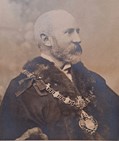
Mayor of Darwen 1898 –1899
James Todd Ballantyne was born in 1845 at Blantyre, Lanarkshire the eldest son of James Ballantyne, a mechanic, and his wife Elizabeth. He was sent to the local village school at the age of four and left there at the age of twelve to assist his father in his mechanics’ shop. After remaining there for a short while his father sent him back to school for another twelve months, by which time he had mastered all the learning available at the village school. His headmaster suggested that he should train for the teaching profession, but James had no wish to do so, preferring to be a joiner instead. His father agreed to this providing he would attend night school after his day’s work.
Therefore, when he was thirteen years old, he entered upon a 7 year’s apprenticeship to the trade of joiner in his home village and whilst learning his trade he also applied himself to the study of various branches of learning. His younger brother taught him the rudiments of Latin and once a fortnight he received private tuition from a headmaster. At the close of his apprenticeship, he left Blantyre and moved to Glasgow, where he studied at the Medical School and graduated from there as a Bachelor of Medicine and Master of Surgery.
In 1876 he married Miss Susannah Downie Shields, daughter of John Shields of Campsie, Stirlingshire and was living in Blackburn. The couple moved to Darwen shortly after their marriage and never had any children. In 1881 Dr Ballantyne entered into partnership with Dr Aspinall, who ran a surgery in Green Street in the town. Their association continued until the retirement of Dr Aspinall six years later, at which time the partnership was dissolved and Mr Ballantyne carried on the business as Surgeon, Physician and General Practitioner at the same address.
In 1888 he bought Holker House in Railway Road, Darwen which had previously been the home and surgery of Dr George Hindle until his death a year earlier. At one time Doctor Ballantyne ran his surgeries from three premises in the town, serving his patients for more than 30 years.
In politics he was a Liberal and in 1894 he entered the Town Council unopposed as one of the representatives of West Central Ward. Four years later he was unanimously elected Mayor of the Borough, an honour which he accepted with some misgivings, for he felt that owing to his professional engagements, he would not be able to devote the necessary time to the duties of Mayor.
During his time in office the council had purchased the tramways system, erected a refuse destructor and the electricity works, had altered and enlarged the hospital for infectious diseases, and passed through Parliament a Local Improvement Bill giving them increased powers.
When in 1899 war broke out in South Africa he started a fund which raised a considerable amount of money for the relief of wives and families of the reservists who were called up to serve in the war.
Upon his retirement from the Mayoralty he wished to leave behind some memento of his year in office. This took the form of a public clock with four dials which he caused to be erected in the turret of the Municipal Buildings in the centre of Darwen, and which remains to this day.
Away from politics he worshipped at the Belgrave Meeting House, was an active member of the Huntington Lectures Committee from its foundation and he was one of the earliest members of the Literary Society, becoming president in 1887.
He was a member of the Harmony and Industry Lodge of Freemasons, and an honorary member of the Newtonian Lodge of the Independent Order of Oddfellows, Manchester Unity. He taught ambulance classes for many years and was an active member of the Nursing Association.
He was also a member of Darwen Golf Club and of the Caledonian Curling Club based in Blackburn.
Throughout his life Dr Ballantyne had collected a large number of paintings and it had been his wish that most of these should be bequeathed to his adopted town upon his death. Whilst he was still Mayor,
Mr John Shields, a cousin of Mrs Ballantyne, painted a portrait showing Dr Ballantyne wearing court dress, and Dr Ballantyne set to designing a suitable frame for this. He spent many years carving the oak frame, which he did in a room at his Green Street surgery whenever his busy public and professional lives allowed.
After the doctor died his widow presented the portrait to Darwen Council, although a small part of the carved frame had not been finished.

Copy of Mr Shields’ portrait at Darwen Heritage CentreOriginal painting held at Blackburn Museum and Art Gallery showing carved frame with unfinished portion
Details of carving on original painting
On the day of his funeral in June 1917 hundreds of townspeople assembled along the route of the cortege to pay tribute to the much-admired doctor. There was a private service at his home, Holker House and at the same time a public service was held at Belgrave Congregational Church, after which the public representatives formed a procession to precede the cortege to the cemetery.
Compiled by Joyce Calder November 2024
Sources:
Original painting images courtesy of Blackburn Museum and Art Gallery
Copy of painting courtesy of Darwen Heritage Centre
Darwen News
Darwen Gazette
findmypast.co.uk
ancestry.co.uk
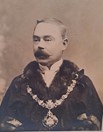 Mayor of Darwen 1899 - 1900
Mayor of Darwen 1899 - 1900
John William Gillibrand was born in Blackburn on 27th April 1854 the sixth of nine children of Thomas Gillibrand, a cotton manufacturer, and his wife, Ann. In about 1862 the family moved to Darwen, close to Hollins Grove Mill from where Thomas ran his successful business. John received his primary education at Mr. Singleton’s school at Spring Bank, after which he spent several terms at Whalley Grammar School before continuing his studies at Malvern College, Worcestershire. Upon leaving college aged 17 he went to assist his father in the mill, and on the death of the latter in 1878 he and his eldest brother Robert succeeded to the business.
The 1891 business directory for Darwen lists Hollins Grove Mill as a "Cotton Spinners and Manufacturers with 1270 looms producing handkerchiefs (coloured and plain bordered), brocades, brilliantes, fancy stripes and checks, jacconnettes, cambrics and shirtings."
In 1887 John W. Gillibrand was appointed a Justice of the Peace for Darwen, and in the following year he stood as the candidate for Darwen North-East Ward. He won the contest with a large majority thus becoming the first ever Conservative member of the town council and was returned unopposed at every succeeding election in the ward.
His principal work on the council was as chairman of the Parks and Recreation Committee, in which capacity he had a great deal to do with the development of Bold Venture and Whitehall Parks. On several occasions he covered the cost of musical performances by local bands in both parks.
He also presented a Meteorological Observatory to Bold Venture Park in commemoration of the Diamond Jubilee of Her Majesty Queen Victoria.
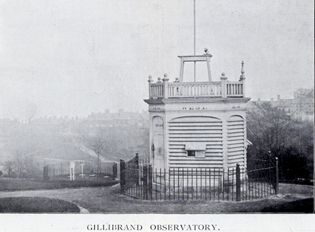
Observations took place twice daily, at 9am and 9pm, and a monthly report of the findings was published in a local newspaper.
As a councillor he played a prominent part in opposing the Corporation when they proposed to purchase additional watershed areas and reservoirs for the town. Together with his brother-in-law, Mr. F.G. Hindle he was instrumental in compelling the Corporation to drop the scheme, which would have placed a serious financial burden on the town.
Mr. Gillibrand was married in 1884 to Mary Agnes Senior, the daughter of Mr. James Senior of Beacon Grange, Sadberge, County Durham. The local newspaper noted that after the ceremony at St. Andrew’s Church the couple caught the 2.47pm train from Darlington en route to the Continent for their honeymoon.
There were two children from the marriage, Thomas Percival born in 1885, and
Hilda Graham born in 1886, but she sadly died at the age of only 4 years.
Mr. Gillibrand was connected to St. Cuthbert’s Church at Hollins Grove from its beginning and was a generous supporter to the church and school. He was a church warden and one of the school managers for many years. By 1891 he and his family had moved to Earlsfield House on Blackburn Road, almost opposite St. Cuthbert’s Church.
Having continued his role as Councillor for the town, he was elected Mayor in 1899 by his peers in a unanimous vote, thus becoming the first Conservative Mayor for the Borough. It was noted that he carried out his duties in the most prompt, impartial, and affable manner possible, and during his tenure he completed several important schemes that were in hand prior to his becoming Mayor. He generously funded an Old Folks’ Christmas Treat at the Co-operative Hall and was considered a worthy and hospitable holder of the position.
Unfortunately, only a few months after the end of his mayoral year he suffered a sudden illness from which he could not recover, and on Christmas Day 1900 he passed away at his home, Earlsfield. His body was taken to St. Cuthbert’s Church for a private funeral, after which he was interred in the family vault at Darwen Cemetery. The cortege was witnessed by a large number of people, including many employees of his mill which had stopped for the day.
Probate was granted to his widow, Mary Agnes Gillibrand and his younger brother,
Frederick James Gillibrand M.D. and he left effects of almost £26,000. The business at Hollins Grove Mill was continued by his son, Thomas Percival Gillibrand.
Compiled by Joyce Calder March 2025
Sources:
findmypast.co.uk
Darwen Heritage Centre
Darwen News
Yorkshire Post newspaper
gov.uk Wills and Administrations
Published April 2025
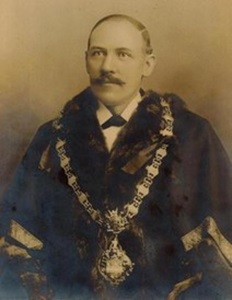
Mayor of Darwen 1902 – 1903
Robert Shorrock was born 22nd October 1855 at Mill Farm Darwen, the son of Ralph Shorrock and his wife, Grace. He was one of 15 children in the family, his parents having both been married previously. Ralph Shorrock had worked as an engineer in the farming business, but by 1861 was listed as a beer seller, living at The King’s Arms, 196 Bolton Road, Darwen.
The first school Robert attended was at the top of Astley Street, conducted by Squire Ratcliffe. He then attended Belgrave School for a short time and at nine years of age began to earn money by selling newspapers for Mr. Robert Nightingale. He then went into the foundry of Messrs. J. & R. Shorrocks and at eleven years of age was working full time.
As a young man Robert worked at the engineering shop at Lea Foundry in the town, but later took up carpentry, becoming an apprentice joiner with his elder brother, William who was already in partnership with Mr. Thomas Hindle at Union Street Sawmills.
In 1874 he married Miss Mary Ann Ellison, the daughter of Mr. William Ellison, a local quarryman of Thorncroft, and they went on to have seven children, living firstly in Ellison Terrace and then for many years in Belgrave Road, Darwen.
In 1877 he founded the firm of Shorrock and Sons Ltd., Contractors and Timber Merchants at Union Street Sawmills, Darwen. The firm quickly became known throughout Lancashire and carried out many important local building contracts, notably the Public Library, the Post Office, Hollins Grove Congregational Church and Avondale Girls’ School. It was also noted that a new organ had been ordered for Lower Chapel and that Mr. Shorrock was making the necessary alterations in the organ loft for its installation.
In 1897 he was invited to serve as councillor for the town, and only five years later was elected as Mayor. During his mayoralty the formal opening of Sunnyhurst Woods took place, the site having been purchased earlier with the proviso that it remain open for public use in perpetuity. It was due to Mr. Shorrock that the Victoria Tower was erected on the moors above Darwen in commemoration of the Diamond Jubilee of Queen Victoria. He also donated the drinking fountain in Bold Venture Park.
The published list of committee members for Darwen Council in 1898 shows Mr. Shorrock as a member of the Waterworks, Cemetery, Markets, Parks and Recreation, Highways, Building and Technical Instruction committees. He also served as Justice of the Peace for the town.
He was a staunch Liberal throughout his life and was for many years the president of William Street Reform Club. He was a past Worshipful Master of Sunnyhurst Freemasons Lodge (4631) and was one of the oldest members of Harmony and Industry Lodge (381)
His recreations included art and music, bowling and motoring in the summer, and occasional billiards in the winter. He was president of the Central Subscription Bowling Club, and chairman of Darwen Band Contest Committee.
He was a loyal Congregationalist throughout his life, worshipping at Belgrave Chapel and it was there that a service was held upon his death before his burial at Darwen Cemetery in September 1932. Probate was granted shortly afterwards at London to his son, William, and his two sons-in-law Walter Henry Watson and Albert Riding. His effects totalled more than £21,000.
Compiled by Joyce Calder July 2025
Sources:
The Blackburn Times
The Blackburn Standard
Lancashire Evening Post
findmypast.co.uk
gov.uk Wills and Administrations
Published August 2025
back to top
Mr George Pickup Holden was born in 1863 and he was the only child of James and Hannah Holden. George was educated at Blackburn Grammar school and left in 1878, going into the cotton trade with his father at Bank Top Mill.
Mr Holden's father, James Holden, died when George was only 17 years of age. In 1891, thirteen years after leaving school, George took over his father’s cotton business and continued until about 1924. At one period, he was also in business at Atlas Mill. In 1895, he was one of the original members of Darwen’s School Board. He served on Darwen Municipal Borough Council from 1902 until he retired in 1926. In 1905, he was appointed Borough Magistrate (August) and was created a Justice of Peace.
He was elected Mayor of the Borough of Darwen (1907/08) and during his year of office every child born in Darwen received a silver cup. Please select the following link in order to listen to Tony Foster's talk via Zoom/Youtube in order to find out more about the: Silver Cups
Mr George Pickup Holden died on Wednesday the 3rd October 1934, aged 71 years of age. His funeral was held on the 6th October 1934 followed by an interment at Darwen Cemetery at 1:30pm.
At the time of his death, he resided at Ambleside, Skelgyll Woods, he had been mildly ill but his condition was not regarded as anything serious.
It was reported that he was a keen musician, just like his father, and received his training from the late Mr Handel Thornley. Mr Pickup Holden played the organ at Holy Trinity Church for Queen Victoria’s Diamond Jubilee commemoration service, and he also played organ at St. James’ Church.
He was also a past president of Darwen Literary Society.
Mr George Pickup Holden was a very well-travelled man, he visited Finland, Russia, Italy, and South Africa. He had been married twice. His first wife, Annie, was the daughter of Mr & Mrs John Brown, of Dumfries. Sadly Annie died in 1924 as the result of a motor accident. Their daughters were Jeanie Rose (born 1892), Winifred (date of birth unknown) and Gertrude Beatrice (born 1894). His second wife was the widow of Mrs G.G. Sames, architect, of Lower Darwen.
In his will he left £24,354 which in 2017 would have approximately equalled £1,233,836.96.
Written & compiled by Connie Alvarez and Scarlet Kennedy, March 2024.
Sources:
The Citizen, September 23,1925
Darwen Weekly Advertiser, October 5th, 1934
The Darwen News, Saturday October 6th, 1934
The Northern Daily Telegraph, Thursday October 4th, 1934
The Liverpool Echo, September 22, 1925
The Lancashire Daily Post, November 13th, 1934
Ancestry.co.uk
Lancashirebmd.org.uk
freebmd.org.uk
lan-opc.org.uk
John Tomlinson
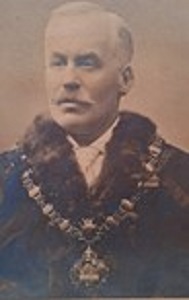
Mayor of Darwen 1900–1902
and 1915–1917
John Tomlinson was born in Oswaldtwistle on 25th July 1846, the eldest child of John and Elizabeth (Betty) Tomlinson. He was baptised at Hippings Wesleyan Chapel in the town. His father, John senior was a sizer in a cotton mill.
In 1850 the family moved to Blackburn where John senior continued working in the cotton trade, eventually working his way up to becoming a partner in the company.
John junior left school whilst still in his teens and was apprenticed to Mr. Nathaniel Walsh of Orchard Mill, with whom he learned the business of cotton manufacturing.
Shortly after turning twenty-one, he left the cotton business to enter the coal trade, starting in Bolton with one horse and a wagon, but he soon saw his business grow rapidly. His younger brother, William joined him as a partner, the business then being known as Messrs. J. and W. Tomlinson. They gradually opened depots in Darwen, Blackburn, Burnley, Horwich, Rochdale and St. Annes, thus becoming one of the largest coal merchants in Lancashire.
Later John served as chairman of the Manchester Coal Exchange for several years. He also became joint owner of the Oswaldtwistle Colliery and sole owner of Stanhope Colliery in the Barnsley district of Yorkshire.
His previous work experience at Orchard Mills led to his continued interest in the cotton industry, and he was actively concerned with the Darwen Manufacturing Company and subsequently became chairman of this successful company.
In 1867 John married Miss Alice Newman, the daughter of Mr. Richard Newman who was a director of Darwen Paper Mills Company. The couple had two daughters, Betsy Jane (born 1868) and Florence (born 1870), and the family settled at Nancy Terrace in Darwen.
In politics Mr Tomlinson was actively connected to the Liberal party in Darwen, becoming chairman of the Executive Committee of Darwen Borough Liberal Association, a position he held for about 20 years.
In 1887 he was elected as representative for Darwen Central Ward serving for many years until becoming Alderman of the Borough in 1901. During his long service he held several posts, including member of the Corporation Committee, member of the School Board and chairman of the Health and Education Committees.
1901 saw him elected a County Councillor and in 1908 he became Justice of the Peace for Lancashire County Council.
The South Africa War (2nd Boer War) had ended in 1902 and there were 14 Darwen men who lost their lives during the war. Their names, along with those who volunteered are recorded on the War Memorial situated in Belgrave Square. The memorial was unveiled on 18 April 1903 and was a personal gift from Alderman Tomlinson.
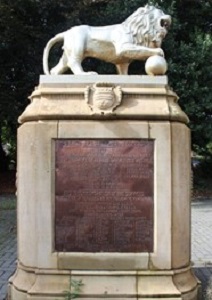 Boer War Memorial, Belgrave Square Darwen
Boer War Memorial, Belgrave Square DarwenThere was a scheme to make Sunnyhurst Woods a public park and in 1900, Mr Tomlinson adopted the idea as a means to celebrate the coronation of King Edward VII. The funds necessary to buy the estate (£2,600) were raised by public subscription. The park was formally opened in July 1903. Many of the trees and bushes planted along the main walk were a gift from Alderman Tomlinson through a trust fund set up to ensure further planting.
In religion he was a Wesleyan, being a regular attendee at Railway Road Chapel to which organisation he gave £500 to enable them to settle an outstanding debt.
He was Circuit Treasurer for the Wesleyan Million Guineas Fund which had been set up in 1898. This was a nationwide scheme which asked families to donate one guinea towards the fund which would then be used for evangelical work. There was provision for Sunday School children to donate one shilling, for which they received a Wesley Medallion (90,000 of these were presented) and all adult contributors of at least one guinea received a printed certificate.
In July 1919 Alderman Tomlinson was created a freeman of the borough of Darwen in recognition of his long service to the town. His wife, Alice suffered from ill health in later life which led them to live in Blackpool South Shore for a number of years. By 1921 the couple were again resident at their home, Earnsdale House in Darwen, which is where Mr Tomlinson passed away on 2 June 1922 after a short illness. He left more than £91,000 in his estate. Probate was granted shortly after his death to his sons-in-law, William Henry Haworth, and Henry Tomlinson, both coal merchants.
Compiled by Joyce Calder April 2025
Sources:
War Memorial image courtesy of Darwen Heritage Centre
Darwen News
Lancashire Evening Post
findmypast.co.uk
gov.uk Wills and Administrations
Published May 2025
Mayor of Darwen 1903–1904
Ralph Yates was born in Lower Darwen in 1857, the son of Henry Yates and his wife Ellen (nee Marsden), and the family lived in Victoria Street for many years. His father was an overlooker in the cotton trade.
Ralph received his early education at Belgrave and Duckworth Street day schools. At the age of fifteen he became a clerk at the Belgrave Mills, but for five years was also an evening student specialising in English, French and German. Whilst still in his teens he became secretary of Duckworth Street Literary Class and became an early member of Darwen Literary Society, later becoming secretary and then President of the same.
At the age of 18 he commenced a cotton waste business with his brother, Edward, later expanding the operation with his brother, Leonard at a depot in Preston and the business soon became well known throughout the north-west of England and abroad.
In 1885 he married Eliza Barton, the adopted daughter of Thomas Eccles, a well-respected cotton manufacturer from Darwen. By 1891 the Yates family were living at Earnsdale Cottage, Darwen with their three children Anna Elisa (b 1885), Helena (1887) and Thomas Cecil (1890). They were later to have three more children – Ralph Eric (1893), and twins Lorna and Rudolph Barton (1900).
In 1893 he became a member of Darwen Town Council and was for many years the chairman of the Library Committee. As chairman he was mainly instrumental in persuading Mr. Andrew Carnegie to provide funds for a new library building in the town. He had previously approached Mr. Carnegie for a gift towards the purchase of books for the existing library, but the gentlemen refused the request, indicating that he may instead be willing to make a grant towards a completely new building.
In 1904 Ralph visited Mr. Carnegie at his home, Skibo Castle in the Scottish Highlands for an interview at which he agreed to donate £10,000 for a new library and requested that there should be a dedicated children’s section there. Two years later the Town Council accepted the tender of Messrs. R. Shorrock and Son at an agreed cost of £9,200 - the remaining £800 would be for any contingencies which might arise.
In September 1906 Mr. Yates laid the foundation stone for the new building, and the library was officially opened on 27th May 1908 by Mr. Carnegie who was made a Freeman of the Borough at the same ceremony.
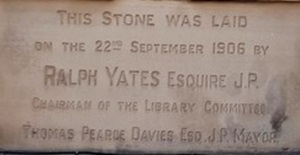 Foundation Stone at Darwen Library
Foundation Stone at Darwen Library
In politics he was a Liberal, proving to be a fair but tough opponent to those who challenged his views. He was a staunch Nonconformist, worshipping at Duckworth Street Congregational Church where he held many of their important offices. His wife, Eliza took an active part in the religious and social life of Darwen, being connected with Congregationalism, the London Missionary Society and the promotion of Cafe Chantant performances in Sunnyhurst Woods.
When not working Mr. Yates was initially a keen cricketer, holding the position of Captain of the town’s second team, but soon took up cycling as a hobby. He cycled over most parts of the British Isles and explored various continental countries. In turn golf became his passion and he joined Darwen Golf Club whose Annual Report for 1912–1913 showed that he paid 1 guinea subscription for the year, alongside his youngest children, Rudolph and Lorna who each paid 10s 6d.
Ralph Yates died on 30th September 1934 aged 77 years, some three years after the death of his wife. He left effects of more than £31,000 and probate was granted to his son, Rudolph Barton Yates, cotton waste dealer and Leonard Smith Gillow, accountant. He was interred at Darwen Cemetery.
Compiled by Joyce Calder, September 2025
Sources:
The Blackburn Times
Manchester Evening News
ancestry.co.uk
findmypast.co.uk
gov.uk Index to Wills and Administrations
Published September 2025James Tomlinson was born at Lower Chapel on 4th January 1838, the son of ThomasTomlinson and Annas (nee Walmsley). He had three older brothers – Gabriel, Thomas and Laurence and one younger sister, Bridget. Sadly, his father died in 1840 aged only 32 years after an asthma attack at the bleach factory where he worked. His mother, Annas then married George Brandwood in 1844 at Blackburn St. Mary’s church and there were four more children born to them.
At the age of eight James began working half-time at Dob Meadows Dyeing and Bleaching Works, often from 5am to 10pm for a wage of three shillings per week. When it did not interfere with his work requirements he was able to attend Mr. Eccles Shorrock’s half-time school in William Street, where he was given a rudimentary education by Thomas Holden, the schoolmaster. When reminiscing about these times later in life he noted that "One week we might go to school half-time and then for 3 or 4 weeks we would never see the place at all. When we missed in this way all we did was to take the attendance book to the schoolmaster, and he would mark it up just as if we had been regularly present."
As a young man he worked as a cotton weaver but soon left that trade to take up employment at Willowfield Ropery in the town. In December 1862 he married Margaret Whittaker at Duckworth Street Congregational Chapel and by 1871 they were living in Queen Street with the first four of their children.
By 1877 he was working as caretaker at Belgrave Independent Chapel, a post which he fulfilled for the next 12 years. By 1881 James and Margaret were living at Belgrave View, now with eight children in the family. Upon leaving his caretaker’s position he set up business on his own account at Willowfield Ropery as a rope and twine maker. He later also took over the Spring Vale Ropery, conducting the business under the title of Messrs. James Tomlinson and Sons. He remained very much involved with this business until ill health curtailed his activities in later life.
It was in 1895 that James came into public life in Darwen when he became representative for Central Ward on the town council. His first chairmanship was at the Building Department at a time when Darwen had entered upon a development scheme which resulted in the erection of a considerable amount of new property in Belgrave Road, Sudellside, Sunnyhurst and Blackburn Road districts.
James was elected to the position of Mayor of Darwen for 1904 and as such was invited to lay the foundation stone of Cobden Mill Darwen, receiving an engraved trowel and mallet as a memento of the occasion.
In 1906 he was appointed Justice of the Peace for the borough and upon the death of Alderman Timothy Lightbown four years later he was unanimously elected an Alderman. In politics he was a Liberal, being at one time president of the William Street Reform Club. He was also a member of the Market Street Liberal Club, and vice-president of the Borough Liberal Association.
He was a member of the local Harmony and Industry Masonic Lodge and in 1909 was elected Grand Master of the Darwen district of the Manchester Unity of Oddfellows, having by then been a member of that order for 53 years.
A Nonconformist, he attended Belgrave Congregational Church holding many positions there, including that of Chapel Committee member.
He was an accomplished musician and for fourteen years played the solo soprano instrument in the old Temperance Band. For many years he was the treasurer for the Darwen Brass Band Committee which was responsible for organising contests and concerts in Bold Venture Park.
Later in life he suffered with ill health and died at his home in Church Terrace on 27th May 1917. His funeral service was at Belgrave Independent Chapel and was attended by many local dignitaries who then formed a procession to the cemetery for his burial alongside his wife. Probate was then granted to two of his sons – John Thomas, a caretaker and Joseph, a rope manufacturer.
Compiled by Joyce Calder, October 2025
Sources:
ancestry.co.uk
findmypast. co.uk
Blackburn Weekly Telegraph
gov.uk Index to Wills and Administrations
Published October 2025
back to top
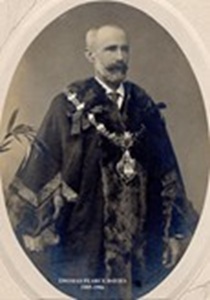 Mayor of Darwen 1905 – 1906
Mayor of Darwen 1905 – 1906Thomas Pearce Davies was invited to become Mayor of Darwen in 1905, a position which his older brother, Ernest Morgan Davies had held some fifteen years earlier. Their father was the pastor at Duckworth Street Chapel for more than twenty years, having begun his ministry in Maidenhead, Berkshire which is where Thomas was born in 1852. He was one of nine children and received his early education as a boarder at Ealing School.
Reverend Thomas Davies and associates bought Greenfield Mill in Darwen with the intention of giving his sons a start in business. The mill was run as a small operation at first, containing 246 looms but when he died the business transferred to Ernest and Thomas, who carried it on with great success, increasing the number of looms to 1180.
In April 1882 Thomas married Lucy Dora Webb at St. John the Evangelist church in Darwen and the couple had eight children, three of whom died in infancy. They lived at Heatherfield, Darwen for many years and Thomas was greatly involved in the running of Duckworth Street Church. He was a teacher in the Sunday School and later became church secretary and treasurer. His great interest in foreign missionary work led to his appointment as the first secretary of the Darwen district of the London Missionary Society.
In 1898 the two brothers, Thomas and Ernest, expanded their company by building Waterfield Mill in Watery Lane, and when Ernest retired the business was carried on by Thomas who remained head of the firm until his death. In later life he did not take an active part, that was taken on by two of his sons and a grandson. This meant that the company originally formed by Rev. Thomas Davies had associations with four generations of the Davies family.
In politics 1901 saw Thomas elected as representative for the Darwen South-West Ward. He became a member of the Borough Council, being appointed chairman of the Finance Committee, a position which he held for many years. He was also chairman of the Education Committee of the council.
In 1905 he was invited to become Mayor, and during the year that he held office became noted for his hospitality and generosity. It was during his time in the position that the foundation stone for the new Carnegie Library was laid by his colleague, Ralph Yates J. P.
 The foundation stone of Darwen Library. it reads:"This Stone was LaidOn the 22nd September 1906 byRalph Yates J.P.Chairman of the Library Committee
The foundation stone of Darwen Library. it reads:"This Stone was LaidOn the 22nd September 1906 byRalph Yates J.P.Chairman of the Library CommitteeThomas Pearce Davies J.P. Mayor"
The following year he was appointed a magistrate for the Borough, continuing in that role until he left Darwen to live in Grange-over-Sands.
He was one of the early members of the Darwen Literary Society, later becoming its chairman, and was the first Darwen resident to become chairman of the Blackburn Chamber of Commerce. He was closely connected to the work of the Nursing Association and was a strong supporter of the Young Men’s Christian Association.
Despite moving to live at Grange-over-Sands he still kept his close connections to Darwen, and shortly before the war began the company started building a garden village at Spring Vale on land owned by them. The houses were planned with gardens around them and were to be let at the lowest possible rents. Unfortunately, the war interfered with much of the scheme, which had to be postponed.
In 1924 his wife Lucy died, and some two years later he married Miss Constance Thorp at Tottlebank Baptist Church, Greenodd, Ulverston. He died in April 1934 at his home, Pengarth, Grange-over-Sands and he left more than £37,000, probate being granted to his sons John Percival Davies and William Russell Davies, both cotton manufacturers and Stanley Webb Davies, artist craftsman.
Compiled by Joyce Calder, December 2025
Sources:
ancestry.co.uk
findmypast. co.uk
Blackburn Times
gov.uk Index to Wills and Administrations
Published December 2025
back to top
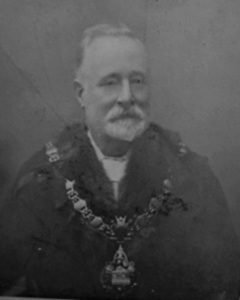 Mayor of Darwen 1906 – 1907
Mayor of Darwen 1906 – 1907
Ralph Shorrock was born in 1836 at Spring Vale Darwen, the son of Bernard Shorrock and his wife Mary, who was the daughter of James Snape of Blacksnape. When he was still a young child the family moved to Union Street in Darwen, his father having obtained an appointment as an engineer at New Mill. At the age of eight Ralph worked part-time in the throstle room at the mill and he was sent to William Street School, which had been established by Messrs. Eccles Shorrock & Company for the benefit of their work people and families. Ralph remained there until he was thirteen when he became a full timer at work, but continued his studies in the evenings.
At the age of 17 he left the mill and became apprenticed for four years to his cousin, Mr. Richard Shorrock to learn the business of a chemist and druggist. At about the time that Ralph finished his apprenticeship his master died, leaving a widow and two young sons, whereupon Ralph took charge of the business on behalf of Mrs. Shorrock. Some 18 months later the couple were married at Blackburn Cathedral and the business continued to flourish, so that they were able to open a second shop in Duckworth Street.
In addition to the chemist and druggist side Mr. Shorrock determined to add dentistry to the business. He had for several years been friendly with Mr. Thomas Deane, a well-established dentist who had a large practice in Oxford Street Manchester. Ralph intimated to Mr. Deane his desire to become a dentist and the gentleman readily assisted him in this venture. Ralph took advantage of his friend’s generous offer, remaining with him for about three years until his knowledge of dentistry was sufficiently advanced to justify him in beginning a practice of his own.
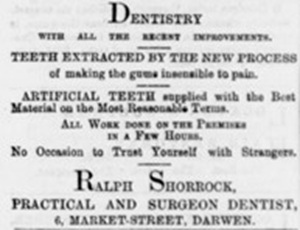
Advertisement in the "Darwen News"
Ralph’s wife, Mary Ann had had two sons with her first husband, John William (born 1855) and Richard (1857), the younger of whom died in infancy. After their marriage in 1858 the couple went on to have four daughters, Rebecca (born 1859, died 1861), Georgina (1861), Constance Rebecca (1862) and Clara (1864). Sadly, Mary Ann died shortly after this last birth and was buried in Darwen Cemetery.
Early in 1871 Ralph married Nancy Isherwood, eldest daughter of John Isherwood. The census shows them living at 40 Railway Road, Darwen and Ralph’s stepson John William had by then joined the business as an apprentice chemist and druggist. Ralph and Nancy had two children, John Isherwood (born 1873) and Mary (born 1876) but Nancy died in 1877, aged only 35 years.
Two years later Ralph remarried, this time to Mary Ann Bell, the only daughter of Edward Sale Bell of Burland House, Howden Yorkshire.
Ralph had been connected with Belgrave Sunday School from childhood. In addition to being a scholar and teacher there, he performed the duties of secretary for six years and those of superintendent for eleven years.
He and Alderman Thomas Davies were joint secretaries of the Nonconformist Sunday School Union, which flourished in Darwen in the 1860s. In 1866 they organised a Sunday School demonstration which was held in India Mill before it was filled with machinery. It was preceded by a procession in which it is estimated that more than 3,000 children took part. A little while before, there had been a Sunday School Festival of Song in the Manchester Free Trade Hall. Mr. Shorrock had the idea of giving a similar festival at Darwen, and with that in mind he bought all the surplus copies of books of music and words used for the training of the children in Manchester. The resulting concert was so popular that it was repeated a second time for those who were not able to attend the first performance.
Alderman Shorrock was a senior deacon of Belgrave Church and was manager of the Belgrave, Bolton Road and Blacksnape day schools for over 30 years. It was in connection with his religious and educational work at Blacksnape that he became known amongst his friends as acquaintances as the "Bishop of Blacksnape." On most Sunday afternoons Mr. Shorrock went to Blacksnape to act as superintendent of the Sunday school, and often also conducted an evening service there. He taught and preached to the people, but he also visited them in their own homes and took an interest in their secular affairs.
In addition, he performed many public duties in Darwen, being a member of the Town Council for more than 28 years, chairman of the Slaughter and Lodging Houses committee and chairman of the Health Committee. He represented Central Ward on the Council for almost seventeen years and in 1904 he was made Alderman in succession to the late Alderman Duxbury. He was President of the Darwen Tradesmen Association from the time it was established and was very much in favour of total Sunday observance.
Mr. Shorrock had several hobbies and was a practical horticulturalist, assisting with the setting up of horticultural shows in Darwen during the 1870’s. Before that he established an athletic club at Darwen which had the most completely equipped gymnasium in the area. He was also a keen amateur photographer and one of the earliest members of the Darwen Literary Society.
Mr. Shorrock had considerable musical skills, was a member of the local Choral Society and took part as an amateur flautist in Mr. James Eccles’s orchestral band. He had a great respect for the ancient rites and ceremonies of Freemasonry and was a member of the Harmony and Industry Lodge 381, which he had joined in 1866 at the age of 30 years.
In later life he suffered ill health and died at his home at Longmarsh Darwen on 25 February 1916 at the age of 79. After a funeral service at Belgrave Chapel, which was attended by his family and friends, the Mayor and several Aldermen of the town, and representatives from many of the societies he had been involved with, he was taken to Darwen Cemetery to be buried in the same grave as his daughter, Rebecca and his first wife, Mary Ann.
Compiled by Joyce Calder, February 2026
Sources:
ancestry.co.uk
findmypast. co.uk
Blackburn Times
Darwen News
Published Febuary 2026

